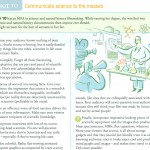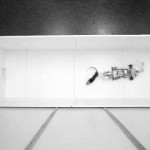
A writing robot. Lacks personality. Credit: Mirko Tobias Schaefer, http://www.flickr.com/photos/gastev/2174504149/
Whenever I have to write about science in detail, or explain a concept, I find that I default to ‘science-robot’ mode.
I write in very dry, technical terms, just getting all the facts in there. And I end up with something that, while technically correct and factually accurate, no one could possibly read without his or her eyes glazing over.
The funny thing is, I don’t normally write like that, and I certainly don’t talk like that.
I first found out about ‘science-robot’ mode in a science writing course I took during grad school. Our instructor asked us to write a short piece about ourselves and why we were taking the course. We turned it in, forgot about it, and proceeded to write our first science-related piece. He then made us revisit that first assignment, and we were all shocked by how different the two articles were.
When writing about ourselves, we’d all found a nice, conversational tone, with a distinct voice. Our science-related pieces, on the other hand, might as well have been written by robots…technically correct, but lacking in any personality, any hint that a real person might have written it.
Sadly, that’s how most scientists are taught to write about their work–that’s why many journal articles and scientific presentations can be so boring.
I’m still trying to unlearn those habits—I need to write in active voice, use stronger verbs, and generally write with more style. I’ve also found that just telling someone else about the science in my story helps me describe it in a simple, conversational way.
For now, I still make a conscious effort to add personality to my writing, but I’m hoping the process will become more organic as I write more.
And it’s not like my inner ‘science-bot’ is all bad—it helps ensure that my explanations are accurate and my facts are right, which is crucial when writing about science. I just need to combine it with my own personality and voice, to make the science approachable and interesting.
I guess I’d end up as some sort of science-writing cyborg?
Anyone else have trouble with their inner ‘science-bots’?







Yea, it definitely is hard to turn off the science-bot. Years of reading science for scientists makes the passive voice seem like the norm.
I also have a hard time not using numbers to justify the conclusions drawn by scientific studies. I need to remind myself that while I may want to see the exact numbers and the stats that support the conclusions, everyday readers probably don’t, and they might even be turned off by that level of detail.
A trick someone taught me is is to pretend that I’m writing an email to a friend or family member about the cool new science I heard about. Sometimes that can be a big help for finding a more casual, personable voice.
I’m impressed by the experiment you relate during the witting course. I write a blog of science and robotics, so your post works as an advice to me. I’m thinking of my last posts right now and… yeah, in some of them (not all of them, fortunately) I use a technichal, computer-like style.
Indeed, those few in which I achieve a personal, friendly voice, are thoose I wrote to entertain people (thinking of my friends, as Sly sais) and not with the purpose of “teaching” anything.
Yes, it’s interesting that in trying to teach or lecture about a particular topic, we can actually make the material harder to understand by losing our friendly voice (and in the process, our audience).
I find it’s easier to write with a less “robotic” voice when we have to do delayed ledes. Something about doing hard news ledes just brings out the inner science robot in me. Perhaps it’s the “just the facts” mindset I go to when I have to write a hard news lede. I’m a little more relaxed when I know I have some room to play with the topic.